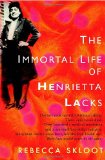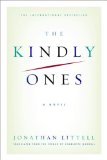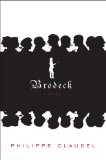As usual, I’m posting my favorite books of the year at year-end. Given that I tend to do a lot of reading over the holidays, I fear that if I do it too early there’s a chance I’ll miss THE book. That didn’t happen this year. In fact, I wasn’t really overwhelmed by anything this year and two of my favorites actually were published last year. That’s why, once again, there is a category specifically for books published before this year.
One thing I realized in preparing this post is that I read both of this year’s “best” books on my nook. I hadn’t realized that at the time of my “year of the nook” post earlier this week. But it reminds me of another drawback to many ereaders. Because I don’t have the color nook, all the photos in the ebook version of the best nonfiction work were in black and white — not handy when the picture captions refer to differences in color.
BEST NOVEL
 I’m sure many people will disagree but I was fairly unimpressed with the fiction this year. The books seemingly getting the most attention — e.g., Freedom and The Passage (as to which see below) — I found okay at best. As a result, Emma Donoghue’s Room tops my list for 2010. As most commentators have observed, the voice of the novel — a 5-year-old boy — is fairly compelling given the somewhat horrific premise. I felt, though, that the book struggled toward the end so, while it is probably the best published this year, it isn’t one I would necessarily proselytize about.
I’m sure many people will disagree but I was fairly unimpressed with the fiction this year. The books seemingly getting the most attention — e.g., Freedom and The Passage (as to which see below) — I found okay at best. As a result, Emma Donoghue’s Room tops my list for 2010. As most commentators have observed, the voice of the novel — a 5-year-old boy — is fairly compelling given the somewhat horrific premise. I felt, though, that the book struggled toward the end so, while it is probably the best published this year, it isn’t one I would necessarily proselytize about.
Whether indicative of my predilections or the state of fiction in American in 2010, my two honorable mentions for best fiction published in 2010 are both science fictional. On the surface, Charles Yu’s How to Live Safely in a Science Fictional Universe is the story of a time machine repairman in a flawed, alternate universe. It really is a story about the search for self, one where Yu has an uncanny ability to use humor to strike at the heart of how we become what we are, whether we like it or not. Similarly, Gary Shteyngart’s satirical dystopian love story (yes, those words all go together in this case) Super Sad True Love Story looks at who we are in a too-much-information age.
NONFICTION
 Comparatively speaking, 2010 was stronger for published nonfiction although, again, nothing struck me as drop dead great. Ultimately, I would have to say Rebecca Skloot’s The Immortal Life of Henrietta Lacks was the best of the year. Skloot’s book could serve as a primer on how to write science journalism. Just as cell research, the subject of the book, takes us to basic levels of the human animal, Skloot takes us to the at times compelling human level of the story behind the science. Some may complain about how Skloot becomes part of the story but had she not done so we may never have known it.
Comparatively speaking, 2010 was stronger for published nonfiction although, again, nothing struck me as drop dead great. Ultimately, I would have to say Rebecca Skloot’s The Immortal Life of Henrietta Lacks was the best of the year. Skloot’s book could serve as a primer on how to write science journalism. Just as cell research, the subject of the book, takes us to basic levels of the human animal, Skloot takes us to the at times compelling human level of the story behind the science. Some may complain about how Skloot becomes part of the story but had she not done so we may never have known it.
The “honorable mention” also features science journalism and a couple memoirs. Mary Roach looks at science in her inimitable way with Packing for Mars: The Curious Science of Life in the Void. Perhaps because I grew up during the space race, I found this to be the most intriguing and enjoyable of her works to date — although I wouldn’t discourage anyone from reading any of her prior books.
It’s the humor — both subtle and not-so-subtle — that are the hallmarks of the two memoirs on the list. Mark Vonnegut’s Just Like Someone Without Mental Illness Only More So was a very strong contender for my favorite book of the year. The follow-up to his memorable The Eden Express: A Memoir of Insanity, Vonnegut looks at the years of his “recovery from” schizophrenia and bipolar disorder — and his fourth psychiatric breakdown “when the voices came back” more than 14 years after his last breakdown. Despite the serious topic, some of the flavor of his father Kurt’s writing style makes the book that much more enjoyable. Less subtle is Justin Halpern’s Sh*t My Dad Says, one of the few books I’ve read in the last number of years that actually had me laughing out loud. I did find it a bit frightening, though, that I think I tend to sound like Halpern’s father.
BOOKS I WISH I’D READ THE YEAR THEY WERE RELEASED
 This category exists because it is not uncommon for me to come across books I love a a couple years after they are first published. What makes this grouping unique in 2010 is that all of the books works in translation and were first published in the U.S. in 2009.
This category exists because it is not uncommon for me to come across books I love a a couple years after they are first published. What makes this grouping unique in 2010 is that all of the books works in translation and were first published in the U.S. in 2009.
Probably my favorite and what some may consider a bizarre choice is Jonathan Littell’s The Kindly Ones. In fact, one might be surprised that a 975-page novel about World War II and the Final Solution from the standpoint of an SS officer who was neck deep in the slaughter could be considered a “favorite” read — or at least question the ethos of the person who considers it such. Yet the book, originally in French (but written by an American) and translated by Charlotte Mandell, is a compelling read. I don’t find it surprising it won France’s two most prestigious literary awards — or that it’s done poorly in the United States. It is an overlooked literary accomplishment.
 Close behind is another French novel, Philippe Claudel’s Brodeck. Like the The Kindly Ones, it takes a different perspective on the concept of guilt. Claudel examines the concept of collective guilt of an occupied community about acts taken regarding both longtime residents and outsiders. Translated by John Cullen, Brodeck also deserves far more attention than it has received in the United States and would serve as a outstanding introduction to anyone who wants to know why modern translated literature is important. Either it or The Kindly Ones may have earned “Best Novel” status had they not been published last year.
Close behind is another French novel, Philippe Claudel’s Brodeck. Like the The Kindly Ones, it takes a different perspective on the concept of guilt. Claudel examines the concept of collective guilt of an occupied community about acts taken regarding both longtime residents and outsiders. Translated by John Cullen, Brodeck also deserves far more attention than it has received in the United States and would serve as a outstanding introduction to anyone who wants to know why modern translated literature is important. Either it or The Kindly Ones may have earned “Best Novel” status had they not been published last year.
Moving from World War II inspired fiction, two other foreign works I loved this year and highly recommend are Santiago Roncagliolo’s Red April and Gerbrand Bakker’s The Twin. The books, though, are quite inapposite. The Twin, a Dutch work translated by David Colmer, is a reminiscence on or exploration of life, obligations and aging. Both topically and in terms of pacing it is akin to Marilynne Robinson’s Gilead and highly deserving of its place on the longlist for the 2010 Best Translated Book Awards. In contrast, Red April, translated by Edith Grossman, is a political thriller based on the Peruvian government’s repressive battle against the Shining Path movement. It is one of those books that grabs you early on and is difficult to put down.
WORST RATIO OF QUALITY TO HYPE
In terms of hype, Jonathan Franzen’s Freedom might take the cake. After all, not many novels are declared the “novel of the century” some 10 years into the century. Still, it had some relative quality and value. There is no such balancing of scales with The Passage by Justin Cronin. This was THE MOST ANTICIPATED book of the year. In actuality, it was basically “a calculated attempt to make money, not literature” or, in other words, a “hackneyed, overwritten pile of poop” resulting from “naked opportunism.” I am surprised how many “best of” lists I saw it on at year end.
BIGGEST DISAPPOINTMENT
I know that in the world of American Lit Mark Twain is “he who must not be impugned.” Yet it’s quite very easy to point to Volume 1 of his autobiography as falling far short of my expectations. After a while my brain and eyes were glazing over so often that I, like Garrison Keillor, started “turning the pages two and three at a time.” Unlike Keillor, though, I gave up entirely about a third of the way through. It wasn’t the only book I abandoned this year but it was the most surprising of them.
The curse of having to be important dooms a lot of us.
Mark Vonnegut, Just Like Someone Without Mental Illness Only More So







